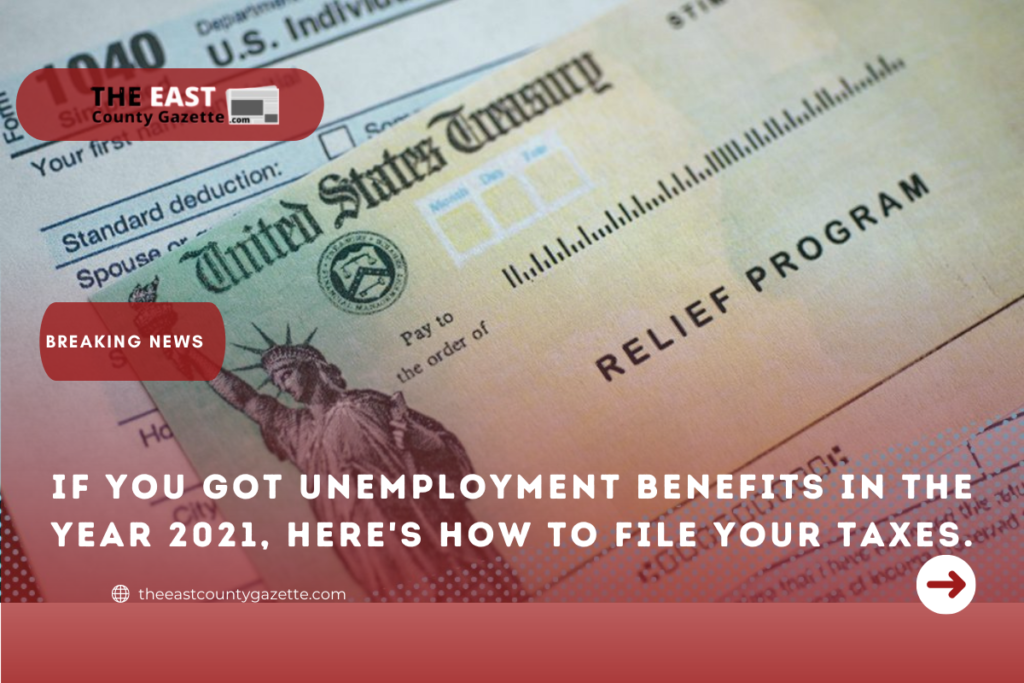When tax season arrives, many Americans will be faced with the prospect of having to file their personal income taxes for the first time. This will entail the continuation of jobless benefits for millions of people.
Knowing how to file correctly will assist you in avoiding a great deal of hassle with the Internal Revenue Service. Let’s have a look at this.
What if you receive unemployment benefits, and you owe taxes on them?
Unemployment benefits are taxable income, to be sure. Income taxes on the number of unemployment benefits you received in 2021 will be due to the Internal Revenue Service (IRS).
Your benefits may potentially push you into a higher income tax rate, though you shouldn’t be overly concerned about falling into a higher tax bracket because of your benefits.
People who file for unemployment benefits have the option of having income taxes withheld from their unemployment benefits, which a large number of them choose to do. If you make this decision, you will have very little to worry about.
What if you didn’t want your unemployment benefits to be garnished because you didn’t pay income taxes? Don’t get too worked up over it.
For those working for a significant portion of the year, filing your taxes may result in a lower tax return or a very small tax bill overall.
Instructions on how to file taxes after receiving unemployment compensation
Following the receipt of unemployment benefits, how do you calculate the amount of money you owe? In order to estimate your tax bill, you should prepare your taxes for submission as soon as possible.
Form 1099-G should be issued to you by your state if you receive unemployment compensation. This statement indicates the amount of money you were paid as well as any federal income tax that you elected to have withheld.
First and foremost, if you’re filing electronically or through a tax preparation service, the process is straightforward.
If you collected unemployment benefits this year, the software package will inquire as to whether you did so, and if you respond affirmatively, it will request information from your 1099-G form. Your tax preparer will request a copy of your 1099-G form from you. This is a straightforward situation in either instance.
- By following the offered directions, you’ll complete Form 1040 (your primary income tax form) as you normally would.
- You will also be required to complete Schedule 1, which contains information about any additional income, such as unemployment benefits.
- On Schedule 1, line 7, you just input your unemployment compensation amount, which you may see on Box 1 of the 1099-G form that you got in the mail.
- Complete Schedule 1 at the end of the day.
- You then take the number on line 22 of Schedule 1 and enter it on line 10a of your 1040 when you have finished filling out your tax return. After that, simply complete the remainder of your 1040 as usual.
What if your unemployment cheque was withheld from you because you owed taxes?
- Box 4 of your 1099-G form contains the amount of tax that has been withheld on your behalf.
- Simply enter that number on line 25-b of your 1040 form and proceed to fill out the rest of the form as usual to complete your 1040.
If your state requires you to file state income tax returns, you will follow a similar procedure for filing your state income tax returns.
Read More: Few Americans May Get More Stimulus Funds This Tax Season
In the event that you owe taxes on unemployment benefits, what should you do?
It’s possible that after going through these steps, you’ll discover that you owe money to the IRS. If this happens to you, don’t be alarmed. You have a number of possibilities.
However, refusing to pay the tax bill is not one of those possibilities. To minimize your tax liability, you should make every effort to pay as much of it as you possibly can.
If you fail to pay your tax bill on time, you will be subject to additional penalties for late payment as well as interest accrued on the amount of money you owe in back taxes. If you continue to fail to file your taxes, the Internal Revenue Service may take legal action against you.
GET AS STARTED AS POSSIBLE WITH YOUR SAVINGS
If the debt isn’t too large, you may be able to simply save up enough money before the April 18 due date to cover the cost of the payment.
This can be accomplished most efficiently by creating a savings plan for yourself, in which a small amount is automatically transferred from your checking account to a savings account once a week is set aside.
CONSULT WITH THE IRS AND ESTABLISH A PAYMENT PLAN
If the sum appears to be too much for you to afford, you should contact the IRS directly. Individual taxpayers who are having problems paying their taxes are assisted by the Internal Revenue Service, despite its negative public image.
It provides delays, waives fines, and, in some cases, even offers to make concessions in tough situations.
To begin, call the Internal Revenue Service at 1–800–829–1040. Try to avoid doing this too close to the April 18th filing deadline, as the IRS is notoriously busy around that time of year.
Please call as soon as possible. Discuss your circumstances with them and inquire about the solutions accessible to you.

